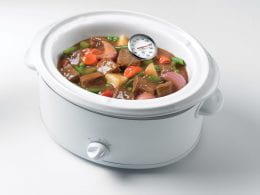
Clostridium perfringens bacteria are one of the most common causes of foodborne illness. The Centers for Disease Control and Prevention estimates these bacteria cause nearly 1 million illnesses in the United States every year.
With soup season upon us, these large batches of thick hot food can be trouble. If the soup is not held above 140°F or not chilled to below 40°F in small batches, then the potential for C. perfringens growth increases. If this bacteria makes spores, which act like a protective coating to help bacteria survive, and food held between 40-140°F will allow the bacteria to grow. It can produce a toxin which can cause foodborne illness symptoms such as diarrhea. Illness can occur within 6 to 24 hours after eating contaminated food.
Prevention steps include cooking soups, whole roasts and whole poultry to safe temperatures. Keep hot foods hot and cold foods cold. Refrigerate leftovers, divided into shallow containers, within two hours after cooking. Reheat leftovers to 165°F before serving.
Source: Centers for Disease Control and Prevention, Prevent Illness from C. perfringens.